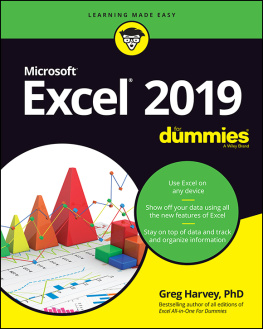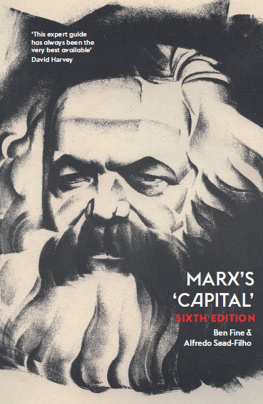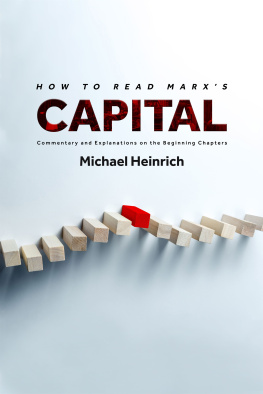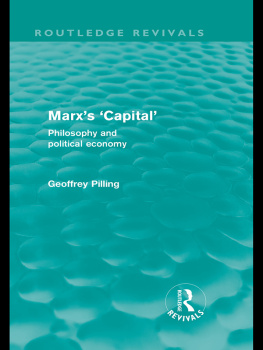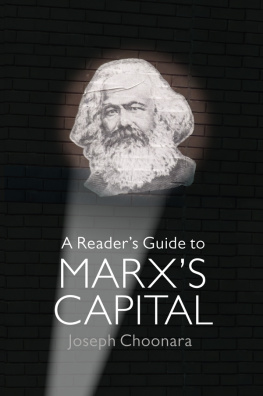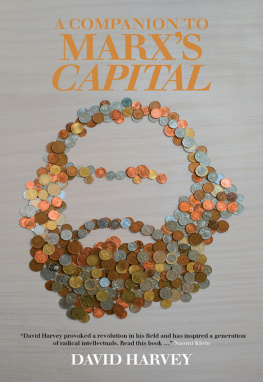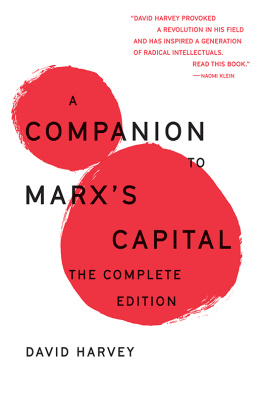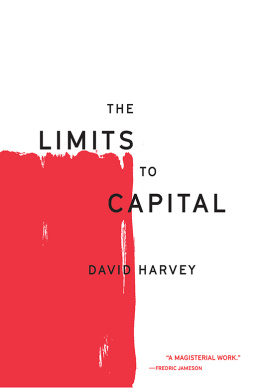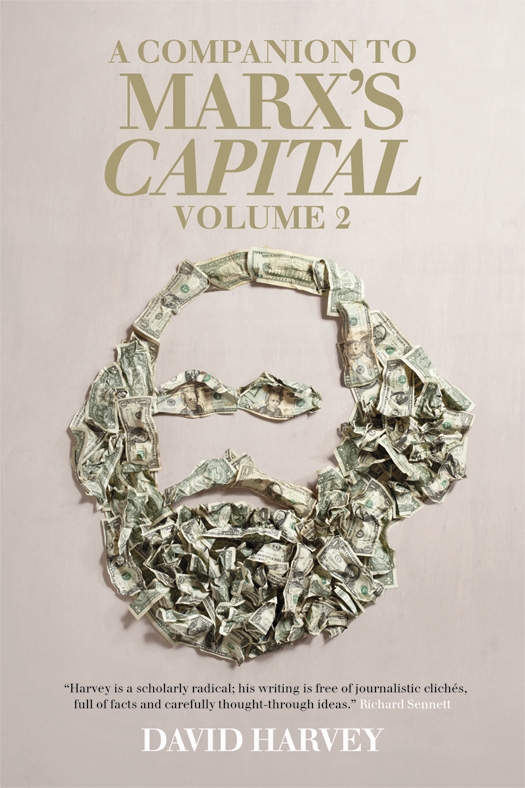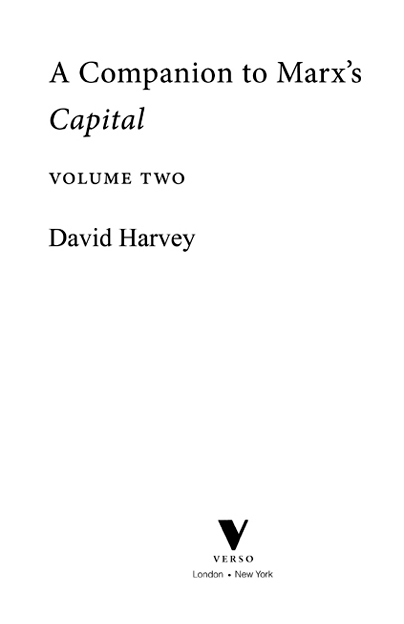First published by Verso 2013
David Harvey 2013
All rights reserved
The moral rights of the author have been asserted
Verso
UK: 6 Meard Street, London W1F 0EG
US: 20 Jay Street, Suite 1010, Brooklyn, NY 11201
www.versobooks.com
Verso is the imprint of New Left Books
British Library Cataloguing in Publication Data
A catalogue record for this book is available from the British Library
Library of Congress Cataloging-in-Publication Data
Harvey, David, 1935
A companion to Marxs Capital. Volume 2 / David Harvey.
pages cm
eISBN: 978-1-78168-184-8
1. Marx, Karl, 1818-1883. Kapital. I. Marx, Karl, 1818-1883. Kapital. II. Title.
HB501.M37H336 2013
335.41dc23
2013018584
A catalog record for this book is available from the Library of Congress
v3.1
Contents
A Note on the Texts Used
The texts used are as follows:
K. Marx, Capital, Volume II (London: Penguin Books in association with New Left Review, translated by David Fernbach, 1978), page numbers cited directly.
K. Marx, Capital, Volume I (London: Penguin Books in association with New Left Review, translated by Ben Fowkes, 1976), citations referenced as C1 followed by the page number.
K. Marx, Capital, Volume III (London: Penguin Books in association with New Left Review, translated by David Fernbach, 1981), citations referenced as C3 followed by the page number.
K. Marx, Grundrisse (London: New Left Review and Penguin Books, translated by Martin Nicolaus, 1973), citations referenced as Grundrisse, followed by page number.
Whereas I worked from a transcript of the lectures in compiling the written version of the Volume I Companion, I did not follow the same procedure in this case. While I have often mined Volume II for particular insights, I did not have the appreciation that comes from teaching it on a regular basis. So I had to learn quite a bit more about the volume as a whole. Before giving the lectures, I therefore compiled lengthy notes on the materials from Volume II and the relevant chapters of Volume III and subsequently went back over these to correct them after the lectures were given. This formed the basis for the first version of the text. I then reread the original texts one more time and came up with further corrections and comments. As so often happens when reading Marx, consecutive readings revealed new insights and layers of meaning. Thus there are some differences and divergences not only in the manner of presentation but also, occasionally, in substantive interpretation between the lectures and this written version. Interpreting Marx is always an ongoing and incomplete project, and this is what often makes it so interesting to read and then reread him.
I want to thank the students who participated in the preliminary seminar on Volume II and those who patiently listened to the lectures at the Union Theological Seminary. Their pertinent questions were always helpful, while Crystal Hall, Priya Chandresakaran, Nkosi Anderson and Chris Caruso graciously and helpfully agreed to interview me about the text for the video version. I am also deeply indebted to Chris Caruso, who both led the film crew and manages my website, and Chris Nizza who edited the video so expertly. Finally, Maliha Safri, kindly read the first draft of the text and suggested some clarifications and reformulations. She is in no way responsible for my interpretations.
Introduction
My aim, as with the Companion to Volume I of Capital, is to get you to read this book. I wish I could add in Marxs own terms but, as I shall shortly show, it is particularly difficult in this case to understand what those terms might be. But, first, I need to persuade you of the importance of undertaking a careful study of Volume II and treating it on a par with Volume I. The case for so doing is, in my view, unassailable.
In the Grundrisse (e.g. 407), Marx unequivocally asserts that capital can be understood only as a unity of production and realization of value and surplus-value. By this, he means that if you cannot sell in the market what has been produced in the labor process then the labor embodied through production has no value. Volume I of Capital concentrates its attention on the processes and dynamics of the production of value and surplus-value, laying to one side any difficulties that might arise out of the conditions of their realization. Marx assumes, in effect, that a market always exists and all commodities produced can be sold at their value. Volume II takes exactly the opposite tack: what turn out to be the fraught and often unstable processes of realization of surplus-value are put under the microscope while assuming there are no difficulties in the realm of surplus-value production. If, as is unfortunately generally the case, the much-studied Volume I is overemphasized while Volume II is neglected and treated as secondary, then, at best, we can get only half of the story of Marxs understanding of capitals political economy. In fact, the implications of the failure to take Volume II seriously are far worse: we fail to understand fully what is said in the first volume because its findings need to be placed in a dialectical relation to those of Volume II if they are to be properly understood.
The unity of production and realization, like that of the commodity, is a contradictory unity: it internalizes an opposition between two radically different tendencies. To ignore its contradictory character would be like trying to theorize capital without mentioning labor, or gender by talking about men and forgetting about women. It is out of the contradictory relations between production and realization that crises frequently arise. Ricardo and his school, Marx notes, never understood the really modern crises, in which this contradiction of capital discharges itself in great thunderstorms which increasingly threaten [the accumulation of capital] as the foundation of society and of production itself (Grundrisse, 411).
Marx clearly warned us of all this in the first chapter of Volume I. In the analysis of commodity production, he initially lays aside questions of use-value as if they do not matter, as if the discovery of the manifold uses of things is the work of history and therefore outside of the purview of political economy. But he then goes on to conclude that nothing can be a value without being an object of utility. If the thing is useless, so is the labour contained in it; the labour does not count as labour, and therefore creates no value (C1, 131). No realization, then no valueand certainly no surplus-value. Volume II studies those conditions that might lead to the value and surplus-value created potentially in production not being realized in monetary form through exchange in the market.
The idea of a deep contradiction between the conditions for the production and realization of surplus-value is so important that I think it wise to provide an initial indication of how it might work in practice. In Volume I, Marx focuses on the implications for the laborer of the ruthless pursuit of surplus-value by capital. The culmination of this enquiry in chapter 25 on The General Law of Capitalist Accumulation concludes that the lot of the laborer is bound to grow worse, that the accumulation of wealth at one pole is at the same time accumulation of misery, the torment of labour, slavery, ignorance, brutalization and moral degradation at the other pole, i.e. on the side of the class that produces its own product as capital (C1, 799). This idea of the increasing impoverishment and immiseration of the working classes has entered with a vengeance into the folklore of the Marxist interpretation of capital. But it is a contingent proposition. It presumes that there are



